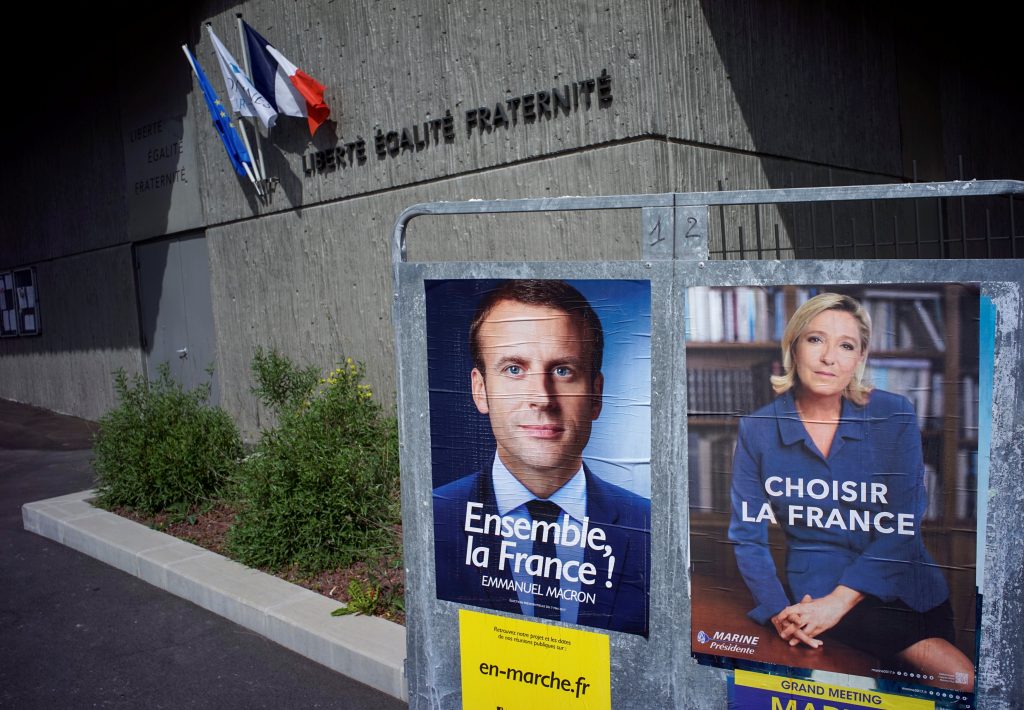Robert Pratta/Reuters
By
Matthias Blamont
A week before the decisive second round in France’s presidential election, many voters are sceptical that either of the two candidates can solve chronic unemployment or tackle security concerns, a poll published on Sunday found.
The Ifop survey for the Journal du Dimanche highlights two key battlegrounds as centrist presidential candidate Emmanuel Macron and far-right opponent Marine Le Pen enter a final week of campaigning – France’s economy and borders.
Polls predict that Macron, a former economy minister, will win the May 7 run-off with about 59-60 percent. But the momentum has recently been with Le Pen, who has clawed back about five percentage points over the past week.
According to the Ifop poll, 45 percent of voters believe the two finalists would not put an end to unemployment, which has for years stood close to 10 percent in France. And 36 percent say neither candidate is able to protect France from attacks.
France has been under a state of emergency since 2015 and has suffered a spate of Islamist militant attacks, mostly perpetrated by young men who grew up in France and Belgium. More than 230 people have been killed in the past two years.
Days before the first round of voting on April 23 a French policeman was shot dead and two others were wounded in central Paris in an attack claimed by the Islamic State group.
The result of the run-off vote will depend to a large extent on floating voters and the level of abstentions.
In the first round 22.2 percent of voters abstained, the highest percentage since 2002 when Marine Le Pen’s father, Jean-Marie, won through to the second round only to be soundly defeated by conservative Jacques Chirac.
This time if turnout is low in the second round analysts say Macron could struggle to reproduce the same broad movement against the National Front candidate, citing his mainly free-market policies at a time when anti-establishment feeling has been on the rise in Europe and the United States.
Left-wing candidate Jean-Luc Melenchon, with 19.6 percent of the votes in the first round, has urged his supporters to oppose Le Pen but has refused to back Macron for the second round.
Le Pen travelled to Marseille on Sunday to speak on the environment, a key issue for Melenchon supporters, while Macron visited the Holocaust memorial in Paris.
The Ifop poll found 42 percent of voters believe neither Macron nor Le Pen would be able to reunite the country after months of bitter campaigning, while 43 percent questioned whether either would be able to govern after capturing the Elysee palace.
France returns to the polls in June to select members of the National Assembly, the lower house of parliament, where a majority is needed to push through government policies.
Both Macron, who launched a new party a year ago, and Le Pen, whose National Front has only two seats in the National Assembly, have faced questions about their ability to build a parliamentary majority.
Le Pen said on Saturday defeated right-wing candidate Nicolas Dupont-Aignan would be her prime minister if she won.
In a statement outlining the alliance struck with Dupont-Aignan’s small nationalist party, Le Pen said there was no rush to dump the euro and that other policy changes might take precedence, in what appeared to be a softening of her stance towards the single currency.
She appeared to reverse this position on Sunday, making clear in a video published on newspaper Le Parisien’s website that she was still intent on leaving the euro eventually.
A policy coordinator with Le Pen confirmed she would call a referendum within six months on France’s future in the European Union, and therefore on the euro, if she were to be elected.
Analysts said the confusion was largely due to the fact that Le Pen’s plans to quit the EU and the euro are among the least popular policies in her protectionist, anti-immigration electoral platform.
Macron received support on Sunday from Jean-Louis Borloo, a previous leader of the UDI, a small centrist party, but has yet to say who he would ask to lead a government.



No Comments Yet!
You can be first to comment this post!